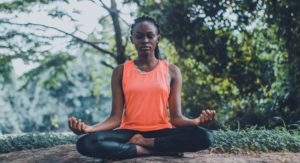Ruvies skin care is a wellness and beauty brand and we are aware of the fact that stress is a constant in our daily lives and as such affects our skin care routine. Sure, you can’t always control the deadlines, disputes, and bad days that cross your path, but you can curb their impact — and score beautiful looks while you’re at it. Our skin is a fantastic communicator of what’s going on inside our bodies.With high levels of stress, you are more prone to experience acne, wrinkles, dry skin and even hair loss. Instead of only recommending topical treatments, dermatologists are also prescribing meditation—the practice of calming your mind to reduce stress

Meditation refers to a state where your body and mind are consciously relaxed and focused. Practitioners of this art report increased awareness, focus, and concentration, as well as a more positive outlook in life.It is most commonly associated with monks, mystics and other spiritual disciplines. However, you don’t have to be a monk or mystic to enjoy its benefits. And you don’t even have to be in a special place to practice it. You could even try it in your own living room!
Meditation slows down the aging process.
Meditating for just a few minutes every day brings energy (also known as prana) into your body and creates a feeling of calm and relaxation. During meditation, prana helps repair your body’s the tissues and cells which give skin a fresh, youthful glow.Also, mindful breathing while meditating adds oxygen to the skin, which is key in boosting cellular health. This increased oxygen rejuvenates your skin, balancing your body and your mind while transforming your body’s cells and tissues.It improves your complexion, reduces wrinkles and slows down the aging process from the inside out. Meditation also lowers blood pressure and tension-related pain such as headaches, ulcers, insomnia, muscle aches and joint problems, making you look and feel younger.

Although there are many different approaches to meditation, the fundamental principles remain the same. The most important among these principles is that of removing obstructive, negative, and wandering thoughts and fantasies, and calming the mind with a deep sense of focus. This clears the mind of debris and prepares it for a higher quality of activity.The negative thoughts you have – those of noisy neighbors, bossy officemates, that parking ticket you got, and unwanted spam– are said to contribute to the ‘polluting’ of the mind, and shutting them out is allows for the ‘cleansing’ of the mind so that it may focus on deeper, more meaningful thoughts.
Some practitioners even shut out all sensory input – no sights, no sounds, and nothing to touch – and try to detach themselves from the commotion around them. You may now focus on a deep, profound thought if this is your goal. It may seem deafening at first, since we are all too accustomed to constantly hearing and seeing things, but as you continue this exercise you will find yourself becoming more aware of everything around you.
The principle here is to be in a comfortable position conducive to concentration. This may be while sitting cross-legged, standing, lying down, and even walking.If the position allows you to relax and focus, then that would be a good starting point. While sitting or standing, the back should be straight, but not tense or tight. In other positions, the only no-no is slouching and falling asleep.Loose, comfortable clothes help a lot in the process since tight fitting clothes have a tendency to choke you up and make you feel tense.

The place you perform meditation should have a soothing atmosphere. It may be in your living room, or bedroom, or any place that you feel comfortable in. You might want an exercise mat if you plan to take on the more challenging positions (if you feel more focused doing so, and if the contortionist in you is screaming for release). You may want to have the place arranged so that it is soothing to your senses.Silence helps most people relax and meditate, so you may want a quiet, isolated area far from the ringing of the phone or the humming of the washing machine. Pleasing scents also help in that regard, so stocking up on aromatic candles isn’t such a bad idea either.
In all, meditation is a relatively risk-free practice and its benefits are well worth the effort (or non-effort – remember we’re relaxing).Studies have shown that meditation does bring about beneficial physiological effects to the body. And there has been a growing consensus in the medical community to further study the effects of such. So in the near future, who knows, that mystical, esoteric thing we call meditation might become a science itself!





